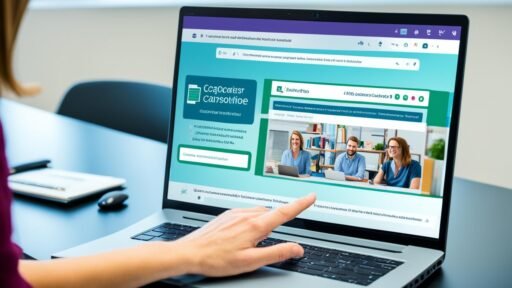The nursing world is changing fast, especially due to the COVID-19 pandemic. This has led to big changes in how nurses learn and train for their jobs. Now, there’s a bigger focus on collecting and analyzing data, teaching about preventing sickness, and using new tech in learning, like simulations and telehealth.
Nursing teachers play a big role in making sure students learn the right things. It’s important that new nurses know how to give great care, based on what works best and how to stay safe. With healthcare always growing and changing, what students learn has to change too. This is so they can understand and handle the complex healthcare world better, and get great results for their patients.
Also Read: What Are The Major Theoretical Approaches In Psychology, And How Do They Differ?
Key Takeaways
- Nursing education is adapting to address emerging trends and challenges in the healthcare industry.
- Data analytics and the integration of preventive healthcare are becoming increasingly important in nursing curricula.
- Educational technologies, such as simulation, telehealth, and mobile health, are being widely adopted in nursing programs.
- Nursing educators are focused on equipping students with the necessary knowledge, skills, and competencies to provide high-quality, safe, and evidence-based care.
- The evolving healthcare landscape requires nursing education to continuously adapt to ensure that future nurses are prepared to navigate the complexities of modern healthcare.
Integrating Data Analytics in Nursing Curricula
Nursing education is changing fast to include data analytics. The healthcare field needs more data for making decisions. So, nursing programs are adding courses about using patient data. This helps future nurses learn how to use data analytics, nursing informatics, and evidence-based practice to improve patient health.
Also Read: What Are The Key Principles And Methodologies Of Software Engineering?
The Role of Data in Enhancing Patient Outcomes
Having lots of patient data and knowing how to use it helps nurses make better choices. They use data analytics to spot trends, find risks, and choose the best treatments for each person. This way, patients get diagnosed quickly and receive treatments that fit their needs. This leads to better patient outcomes.
Also Read: What Are The Admission Requirements For University Of Lynchburg?
Teaching Data Interpretation Skills to Nursing Students
Nursing schools are focusing on teaching students how to interpret data. They learn to work with nursing data, understand statistics, and use data in their jobs. This prepares them to use data analytics well in caring for patients.
Also Read: What Are The Notable Programs Offered At University Of Jamestown?
“Nurses who can effectively interpret and apply data will be better equipped to make informed decisions, leading to improved patient outcomes and a more efficient healthcare system.” – Dr. Emma Wilkins, Nursing Informatics Specialist
The healthcare field is always changing, and data analytics in nursing is key to its future. Nursing programs are making sure their graduates are skilled in using data. This helps them succeed in the modern healthcare world.
Addressing the Nursing Shortage through Quality Education

The COVID-19 pandemic showed how important well-prepared nurses are needed. The World Health Organization says we need 9 million more nurses by 2030. Many nursing schools are now offering new ways of learning, mixing online and in-person classes to teach better.
Also Read: What Are The Academic Achievements Of University Of Hawaii Basketball Players?
Impact of COVID-19 on Nursing Education
The pandemic changed how nurses are trained, shifting to online and virtual classes fast. This brought challenges but also new chances. It made using digital tools for learning more common and improved the quality of nurse education.
Ranking of Online Graduate Nursing Programs
More and more people are choosing online graduate nursing programs. The University of Cincinnati’s online graduate nursing programs stand out for their tough academics and preparing nurses for the future of healthcare.
The University of Cincinnati’s online MSN program is in the top 25 in the U.S. This shows how seriously they take providing top-notch nurse education. They help students learn what they need to fill the nursing shortage and offer great patient care.
“The COVID-19 pandemic has highlighted the critical need for well-prepared nurses, driving the demand for quality nursing education and training.”
As healthcare changes, so does the need for top-level nursing education. Schools that focus on getting nurses ready make a big difference. They help fight the nursing shortage and make sure patients get excellent care.
Nursing Education Focused on Preventive Healthcare
With more people getting access to preventive healthcare, nursing education is changing. It’s focusing more on helping people stay healthy. This way, fewer people may need to go to the hospital. And, it leaves more resources for the very sick.
Nurses are learning to suggest tests, give advice, and offer ways to prevent sickness. This change is all about making sure people do their best to keep healthy. By teaching future nurses these things, nursing education hopes to make a big difference in healthcare.
- Emphasizing preventive care strategies in nursing curricula
- Training nurses to provide evidence-based recommendations for screenings, counseling, and preventive treatments
- Empowering patients to take a more active role in managing their own health
- Reducing strain on the healthcare system by preventing unnecessary hospital visits
“Preventive healthcare is the key to a health system that’s fair and lasts. When we focus on preventive nursing education, we give nurses the power to change how we look at keeping whole groups of people healthy.”
As the way we think about healthcare changes, adding preventive healthcare lessons to nursing is critical. It aims to change how we care for people. By teaching these lessons now, nurses can really help make the future healthier for everyone.
Empowering Nurses to Handle Patient Knowledge Overload

In today’s world, patients often know a lot from different online sources. This can be hard for nurses. They need to understand what patients already think and still give great care. Nursing programs are preparing students for this challenge. They learn to be sure of what they know and how to help patients deal with too much information.
Strategies for Managing Patient Expectations
Nursing classes focus on how to talk and listen well. They teach students to hear what patients say and to find common ground with them. Techniques include listening well, showing you understand, and making decisions together. This makes patients feel valued. It helps make treatments more effective because patients are more likely to follow through with what’s planned.
Importance of Evidence-Based Practice
Another key lesson in nursing is evidence-based practice. This means making choices based on what research shows to work best. Nurses learn to use the newest information along with their own knowledge and what the patient prefers. This helps connect what patients know with the most trusted treatments available.
“Nurses who are equipped with the knowledge and skills to navigate patient information overload and manage expectations are better positioned to deliver high-quality, evidence-based care that truly benefits their patients.”
Nursing education is making nurses better at handling patient knowledge and expectations. This trend is shaping a healthcare system that values what patients know, expect, and what’s proven to work. These skills allow nurses to provide care that is tailored and cooperative. The result is happier patients and better health results.
Continuing Professional Development for Nurses

Nursing is always changing. This makes learning more and more vital for nurses. They should seek further education like advanced degrees and special certifications. Online learning is a great option too.
Online Nursing Education Options
The University of Cincinnati and other schools provide many online courses for nurses. These include specialized MSN programs. Nurses can study online and still work. This way, they can improve their skills without stopping their patient care.
Specialization Tracks for Career Advancement
- Nurses have many options for specialization. For example, they can become family nurse practitioners or nurse educators.
- Taking these courses can help nurses move up in their careers and find better job chances. Plus, it can lead to better care for their patients.
- Many of these online programs let nurses earn more than one certification or degree. This way, they can keep learning and growing.
“Investing in continuing nursing education and professional development not only benefits the individual nurse but also strengthens the entire healthcare system by ensuring a highly competent and adaptable nursing workforce.”
Staying up to date in nursing is key for the future. By taking these education chances, nurses can do really well in their careers. More importantly, they can help their patients a lot more.
Adoption of Educational Technologies
Nursing education is changing fast, using more educational technologies. Nursing schools are exploring new ways to teach. This includes online tools and digital resources.
Benefits of Interactive Learning Strategies
New methods like simulation, virtual reality, and games are now in nursing courses. These tools help students get more involved. They improve thinking skills and how to handle real-life situations.
- Simulation-based learning lets students practice in realistic situations without risk to real patients.
- Virtual reality lets them enter a lifelike world where they can learn without causing any harm.
- Gamification turns learning into a fun competition, while also teaching and giving immediate feedback.
Gamification and Game-Based Learning
Gamification is great for keeping nursing students interested. It uses game features like scores or challenges. This makes learning more exciting and rewarding.
“Gamification has the potential to transform nursing education by making the learning process more interactive, enjoyable, and effective.”
Games also help nursing students practice and improve their skills. They learn by doing and get feedback right away. This makes the transition from theory to practice smoother and prepares them for nursing jobs.
By using nursing education technology, we are creating a better way to teach nursing. These new methods make learning more engaging and prepare students to be great nurses.
Preparing Nurses for Telehealth and Telemedicine
The COVID-19 pandemic sped up how much we use telehealth and telemedicine. Nursing education is changing to make sure students can give great care virtually. Students now learn how to protect patient privacy and check up on them online. They also learn to use tech that monitors patients’ health.
Now, nurses can care for people through the internet. This makes healthcare easier to get for many. Nurses learn how to give special care to those who find it hard to get to a doctor.
Enhancing Telehealth and Telemedicine Competencies
Nursing programs are focusing more on teaching about telehealth and telemedicine. They teach students how to talk with patients online. They also learn how to use tools like video calls and health monitors safely.
- Effective communication strategies for virtual consultations
- Proper use of digital health technologies, such as video conferencing and remote monitoring devices
- Maintaining patient privacy and data security in a virtual setting
- Integrating telehealth and telemedicine into comprehensive patient care plans
Including these lessons in the nursing curriculum helps ensure the new nurse generations are ready for telehealth and telemedicine.
Telehealth and Telemedicine in Nursing Practice
Teaching nurses how to use virtual care shows how important telehealth and telemedicine are becoming. Skilled nurses make it easier for patients to get care and help lighten the load on hospitals. This leads to better health results for patients.
With more people wanting telehealth and telemedicine, teaching nurses is crucial. It helps create a workforce ready for the future of healthcare.
“The ability to provide virtual care has become a critical skill for nurses in the 21st century. Nursing education must keep pace with the rapid advancements in healthcare technology to ensure our graduates are well-equipped to deliver high-quality, accessible care to patients through various digital platforms.”
Integrating Mobile Health Technologies in Nursing
Nursing schools now teach students about mobile health technologies. These include devices and apps for health. This helps students understand how to use them for patient care.
Wearable Devices and Health Apps
Nursing students learn to use wearable devices and health apps. These tools collect health data in real-time, helping nurses stay connected with patients’ health. It’s a part of their education so that they’re ready to use these tools after graduating.
Remote Patient Monitoring Systems
There’s also a focus on remote patient monitoring in nursing education. These systems let nurses monitor patients from afar, offering constant health data. Students are taught how to use and understand this data, making them skilled in using technology for patient care.
| mHealth Technology | Benefits for Nursing Education |
|---|---|
| Wearable Devices | Teach students how to use immediate data for looking after patients |
| Health Apps | Show students how to apply mobile health apps for better patient care |
| Remote Patient Monitoring | Help students learn to use remote patient monitoring for ongoing care improvement |
By including these new mobile health technologies in lessons, educators are preparing future nurses well. They will know how to use the latest healthcare tools to give top-notch care to their patients.
Simulation Technology in Nursing Education
Nursing education is changing for the better, thanks to simulation technology. This tech is crucial in training our future healthcare workers. Using nursing simulation in lessons gives students chances to improve. They can work on their clinical skills and critical thinking in a safe space.
Unfolding Case Studies
Unfolding case studies are a major step forward in nursing education. They present students with challenges, making them use their skills in different patient contexts. As students tackle complex patient cases, they learn to think ahead and adjust to changing situations.
High and Low-Fidelity Mannequins
Notable progress in nursing education is the use of nursing mannequins. High-fidelity mannequins mimic real patients with interactive features. They let students practice various skills on a lifelike model. Low-fidelity mannequins, on the other hand, help students start with the basics. This prepares them for more advanced simulations later.
| Simulation Type | Key Features | Learning Objectives |
|---|---|---|
| High-Fidelity Mannequins |
|
|
| Low-Fidelity Mannequins |
|
|
Nursing schools benefit by using various simulation tools. These tools help build a learning path that connects the classroom with the real medical world. Such an approach equips students with the necessary skills and confidence. They prepare themselves to deliver top-notch care to patients.
Nursing and Artificial Intelligence
The future of nursing education includes top-notch technologies like artificial intelligence (AI). These tools can spot high-risk patients and predict outcomes. They can also help with diagnosing and planning treatments.
Artificial Intelligence in Healthcare
AI is shaping healthcare by improving patient results and how nurses work. Students learn to use AI to review lots of patient data. This helps find new trends and gives personalized advice to nurses. It helps nurses make better choices and give top-notch care.
Virtual and Augmented Reality Simulations
Nursing students are also using virtual reality (VR) and augmented reality (AR) for learning. These techs offer safe settings to practice skills. It prepares students for real patient care and boosts their confidence.
“The integration of artificial intelligence and virtual/augmented reality in nursing education is not only enhancing the learning experience but also equipping the next generation of nurses with the skills and tools they need to thrive in the rapidly evolving healthcare landscape.”
The nursing field is changing, and AI and VR/AR in education are key. These new tools help nursing students learn to offer great care. They prepare them to be leaders in healthcare.
Innovative Learning Approaches
Nursing education is changing, using new ways to help students learn and remember. One exciting way is through digital “escape room” experiences. These allow nursing students to practice their skills in a virtual, hands-on way.
Digital Escape Rooms
Digital escape rooms are like video games but for learning. They make nursing students solve puzzles and challenges together. This virtual world feels like real healthcare situations. It tests the students’ nursing knowledge, thinking abilities, and how well they can work in a team.
These rooms help students get better at making decisions and working with others. They prepare students for what they might see in real-life healthcare jobs. Using these games makes learning fun and helps students perform better overall.
Supplemental Digital Resources
Now, nursing books and study materials are including extra digital items. These can be online simulations, case studies, or videos that make learning more fun and real.
These new ways of learning help teachers meet the needs of different students. It helps students remember what they’ve learned and get better at important skills. This leads to success in their studies and future jobs.
“Innovative learning approaches, such as digital escape rooms and supplemental digital resources, are transforming the way nursing students engage with and master essential concepts. These engaging, technology-driven tools not only enhance student learning but also better prepare future nurses for the dynamic challenges they will face in the field.”
Also Read: Elevating Education: The Significance Of Degree Courses
Conclusion
Nursing education is quickly changing to keep up with healthcare. This change is coming from new data tools, tech in education, online health, and artificial intelligence (AI). Teachers in nursing schools have a big job. They need to teach students all they need to know. This includes how to care for others with the latest, safest, and smartest methods.
With new ideas and tech, the nursing world is leading healthcare forward. Students learn how to use big data, video health, and AI. This makes them ready for the complicated health world of tomorrow.
Healthcare is changing fast, and nursing needs to keep up. Using new tech in nursing classes is crucial. It helps the next group of nurses do well in this new world. This way, nursing continues its important work in improving health and the future of medicine.
FAQs
What are the latest advancements in nursing education and training?
The world of nursing education is changing fast, especially with the impact of COVID-19. It now leans more on tracking and using data, preventing illness, and using tech for teaching like simulations, telehealth, and mobile apps.
How is data analytics being integrated into nursing curricula?
Students are learning data’s key role in making smart choices. They study how to look at patient info critically. This helps them make better healthcare decisions.
How is nursing education addressing the nursing shortage?
The need for well-trained nurses has never been clearer since COVID-19. More schools are offering online and blended learning options. This lets students learn more to help fill the nursing gap.
What is the focus on preventive healthcare in nursing education?
With more people needing healthcare, nurses are taught to prevent illness. They learn ways to keep people healthy, like doing tests, offering advice, and suggesting medicine to stop problems before they start.
How is nursing education addressing patient knowledge overload?
Nurses are taught to trust what they know and help patients understand it all. They learn to check studies and facts carefully. This way, they make choices that are best for patients.
What opportunities for continuing professional development are available for nurses?
Today, nurses can keep growing by learning more. They’re encouraged to get advanced degrees and special certifications. There are also online courses to help them be better at what they do.
What educational technologies are being integrated into nursing curricula?
Nursing programs use tech like simulations, virtual reality, online games, and apps. These tools help students get ready for their nursing careers in a more active and realistic way.
How are nursing students being trained for telehealth and telemedicine?
Now, students learn how to use tech to care for people from a distance. This includes learning about privacy and using tools to watch over patients without needing to be there physically.
What role do mobile health technologies play in nursing education?
Students are taught to use tech that helps look after a patient’s health anywhere. This can mean wearable devices, health apps, or even systems that watch a patient’s health from afar. It makes caring for people more flexible and easier.
How is simulation technology being used in nursing education?
Simulations are a big part of nursing training. They give students chances to practice in a safe setting. This includes using different types of mannequins and scenarios to prepare for meeting real patients.
How is nursing education incorporating artificial intelligence and virtual/augmented reality?
Nursing students now learn how AI can help in healthcare, like spotting at-risk patients. VR and AR also play a role, giving students hands-on, detailed training in a controlled setting.
What innovative learning approaches are being used in nursing education?
To make learning more fun, nursing schools use things like digital escape rooms. They also mix in simulations and case studies in their lessons. This combination boosts students’ excitement and how much they remember what they learn.





